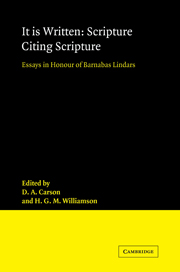Book contents
- Frontmatter
- Contents
- Preface
- Biographical note
- Abbreviations
- 1 An assessment of recent developments
- THE OLD TESTAMENT IN THE OLD TESTAMENT
- BETWEEN THE TESTAMENTS
- THE OLD TESTAMENT IN THE NEW TESTAMENT
- 11 Text form
- 12 Matthew
- 13 Mark
- 14 Luke/Acts
- 15 John and the Johannine Epistles
- 16 The Pauline literature
- 17 Hebrews
- 18 James, 1 and 2 Peter, Jude
- 19 Revelation
- Indexes
13 - Mark
Published online by Cambridge University Press: 16 January 2010
- Frontmatter
- Contents
- Preface
- Biographical note
- Abbreviations
- 1 An assessment of recent developments
- THE OLD TESTAMENT IN THE OLD TESTAMENT
- BETWEEN THE TESTAMENTS
- THE OLD TESTAMENT IN THE NEW TESTAMENT
- 11 Text form
- 12 Matthew
- 13 Mark
- 14 Luke/Acts
- 15 John and the Johannine Epistles
- 16 The Pauline literature
- 17 Hebrews
- 18 James, 1 and 2 Peter, Jude
- 19 Revelation
- Indexes
Summary
It is perhaps understandable that the editors assigned a mere 4,000 words to this chapter, for at first sight Mark seems to make little appeal to the Old Testament. In contrast to Matthew and Luke, who in their different ways emphasise the fulfilment of scripture, Mark includes only one explicit editorial quotation, in 1: 2f, and gives that a wrong attribution.
But appearances are deceptive. Mark handles the material in his own distinctive way, and the opening quotation is significant: his story is good news precisely because it is the fulfilment of scripture. Thereafter, Jesus' words and activities constantly echo OT scenes and language, until what is ‘written’ of the Son of Man (9:12; 14:21) is finally fulfilled. There is no dearth of references: one recent article (Kee, 1975) listed 57 quotations and approximately 160 allusions (not counting passages which had possibly ‘influenced’ Mark) in chapters 11–16 alone! But they do not all fit into the pattern of ‘fulfilment’, for in some cases Jesus appears to take issue with Scripture, notably in discussions about the law.
To deal adequately with the use of the OT in Mark's gospel in one chapter is clearly an impossible task. In order to reduce the problem to manageable proportions, we shall confine our attention to those quotations and allusions which can be traced to the Pentateuch. Inevitably, this will raise the crucial question of Mark's attitude to the law, even though that particular term is never used by Mark: does he believe that the law has been abrogated by the gospel?
- Type
- Chapter
- Information
- It Is Written: Scripture Citing ScriptureEssays in Honour of Barnabas Lindars, SSF, pp. 220 - 230Publisher: Cambridge University PressPrint publication year: 1988

